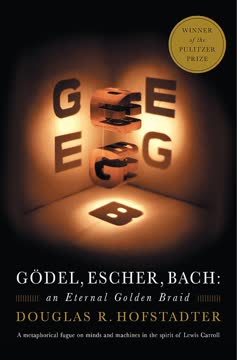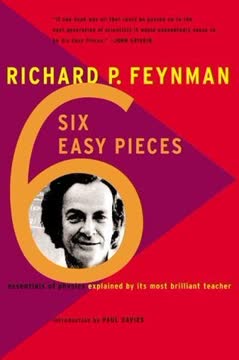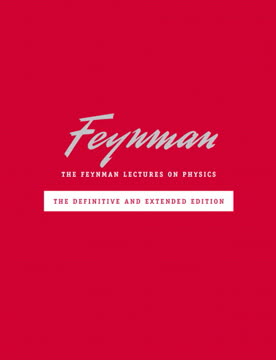Key Takeaways
1. Scientific curiosity begins with childhood wonder
"My father dealt a little bit with energy and used the term after I got a little bit of the idea about it. What he would have done I know, because he did in fact essentially the same thing–though not the same example of the toy dog. He would say, 'It moves because the sun is shining,' if he wanted to give the same lesson."
Nurturing curiosity. Feynman's journey into science began with his father's innovative approach to teaching. Instead of simply providing answers, his father encouraged him to observe, question, and discover the world around him. This early exposure to scientific thinking laid the foundation for Feynman's future work.
Learning through exploration. By exploring nature and asking questions about everyday phenomena, young Feynman developed a deep appreciation for the interconnectedness of the natural world. This approach to learning fostered his ability to see beyond the surface and uncover the underlying principles governing the universe.
2. Unconventional thinking leads to groundbreaking discoveries
"Feynman has combined theoretical brilliance and irreverent skepticism throughout his career."
Challenging conventions. Feynman's success in physics can be attributed to his willingness to question established theories and explore unconventional ideas. This approach allowed him to make significant contributions to quantum electrodynamics and other fields.
Creative problem-solving. By approaching problems from unique angles, Feynman was able to develop innovative solutions and tools, such as the Feynman diagrams, which revolutionized the way physicists visualize and calculate particle interactions.
Key aspects of Feynman's unconventional thinking:
- Questioning assumptions
- Approaching problems from multiple perspectives
- Embracing uncertainty and doubt
- Using intuition and visualization techniques
3. Quantum electrodynamics: A revolutionary theory of particle interactions
"The next great era of awakening of human intellect may well produce a method of understanding the qualitative content of equations."
Simplifying complexity. Quantum electrodynamics (QED) provided a unified framework for understanding the interactions between light and matter at the subatomic level. Feynman's contributions to this theory helped simplify complex calculations and made it possible to predict experimental results with unprecedented accuracy.
Practical applications. QED has far-reaching implications in various fields, including:
- Electronics and semiconductor technology
- Laser and optical technologies
- Medical imaging and treatments
- Quantum computing and information processing
4. The importance of integrity and doubt in scientific progress
"The first principle is that you must not fool yourself–and you are the easiest person to fool. So you have to be very careful about that. After you've not fooled yourself, it's easy not to fool other scientists. You just have to be honest in a conventional way after that."
Scientific integrity. Feynman emphasized the crucial role of honesty and transparency in scientific research. He advocated for rigorous self-examination and the willingness to admit mistakes or uncertainties.
Embracing doubt. The ability to question one's own assumptions and remain open to new evidence is essential for scientific progress. Feynman believed that doubt and skepticism were not weaknesses, but rather strengths that drove scientific inquiry forward.
Key principles of scientific integrity:
- Transparency in methods and results
- Willingness to admit errors and limitations
- Openness to criticism and alternative viewpoints
- Rigorous peer review and replication of experiments
5. Feynman's unique approach to problem-solving and education
"I cannot do a sum-up of all this stuff now. I have thought about these things so many times alone that I hope you will excuse me if I remind you of some thoughts that I'm sure you have all had–or this type of thought–which no one could ever have had in the past, because people then didn't have the information we have about the world today."
Interdisciplinary thinking. Feynman's approach to problem-solving often involved drawing connections between seemingly unrelated fields. This interdisciplinary perspective allowed him to tackle complex problems in innovative ways.
Effective communication. As an educator, Feynman had a remarkable ability to explain complex concepts in simple, relatable terms. His lectures and writings continue to inspire and educate students and scientists around the world.
Feynman's teaching techniques:
- Using analogies and real-world examples
- Breaking down complex ideas into simpler components
- Encouraging hands-on experimentation and exploration
- Fostering a sense of wonder and curiosity in students
6. The Nobel Prize: A mixed blessing for scientists
"You could have told me that in the morning."
Recognition and responsibility. Winning the Nobel Prize brought Feynman international recognition for his work in quantum electrodynamics. However, it also came with increased expectations and public scrutiny.
Maintaining focus. Despite the accolades, Feynman remained committed to his scientific pursuits and teaching. He emphasized the importance of continuing to ask questions and explore new ideas, rather than resting on past achievements.
Challenges associated with winning the Nobel Prize:
- Increased media attention and public expectations
- Pressure to produce groundbreaking research
- Potential distractions from ongoing scientific work
- Balancing personal and professional life in the public eye
7. Cargo Cult Science: The dangers of pseudoscience and self-deception
"The easiest way to explain this idea is to contrast it, for example, with advertising. Last night I heard that Wesson Oil doesn't soak through food. Well, that's true. It's not dishonest; but the thing I'm talking about is not just a matter of not being dishonest, it's a matter of scientific integrity, which is another level."
Identifying pseudoscience. Feynman coined the term "Cargo Cult Science" to describe practices that mimic the appearance of scientific research without adhering to its rigorous methods and principles.
Critical thinking. By highlighting the differences between genuine scientific inquiry and pseudoscience, Feynman emphasized the importance of critical thinking and skepticism in evaluating claims and evidence.
Characteristics of Cargo Cult Science:
- Lack of reproducibility in experiments
- Cherry-picking data to support predetermined conclusions
- Ignoring or dismissing contradictory evidence
- Relying on anecdotal evidence rather than systematic studies
8. The quest for fundamental particles: From atoms to quarks
"We have many studies in teaching, for example, in which people make observations and they make lists and they do statistics, but they do not thereby become established science, established knowledge."
Evolution of particle physics. Feynman's work contributed to the ongoing quest to understand the fundamental building blocks of matter. This journey has led scientists from atoms to subatomic particles and, eventually, to the theory of quarks.
Challenges and uncertainties. The search for fundamental particles has revealed new layers of complexity in the universe. Feynman acknowledged the difficulties in experimentally verifying theories about particles like quarks and emphasized the importance of continued research and skepticism.
Key milestones in particle physics:
- Discovery of atoms and elements
- Identification of protons, neutrons, and electrons
- Development of quantum mechanics
- Proposal of quarks as fundamental particles
- Ongoing research into string theory and beyond
9. The value of science extends beyond practical applications
"Applications aren't the only thing in the world. It's interesting in understanding what the world is made of. It's the same interest, the curiosity of man that makes him build telescopes."
Intrinsic value of knowledge. Feynman argued that scientific pursuit has inherent value beyond its practical applications. Understanding the universe satisfies human curiosity and contributes to our cultural and intellectual growth.
Unexpected benefits. While some scientific discoveries may not have immediate practical applications, they often lead to unforeseen technological advancements and innovations in the future.
Reasons to support basic scientific research:
- Satisfying human curiosity about the nature of reality
- Developing critical thinking and problem-solving skills
- Inspiring future generations of scientists and innovators
- Potential for unexpected technological breakthroughs
- Fostering international collaboration and understanding
Last updated:
FAQ
What's The Pleasure of Finding Things Out about?
- Collection of Works: The book is a compilation of Richard P. Feynman's best short writings and lectures, offering insights into his thoughts on science, philosophy, and the human experience.
- Diverse Topics: It covers a wide range of subjects, including scientific culture, computing machines, and reflections on the atomic bomb's creation.
- Personal Insights: Feynman shares personal anecdotes and insights from his life as a physicist, providing a unique perspective on science and its implications.
Why should I read The Pleasure of Finding Things Out?
- Engaging Writing Style: Feynman's conversational and humorous style makes complex scientific concepts accessible and enjoyable for readers of all backgrounds.
- Inspiration for Curiosity: The book encourages readers to embrace curiosity and the joy of discovery, emphasizing the importance of questioning and exploring the world.
- Legacy of a Great Mind: It connects readers with the thoughts and ideas of one of the most influential physicists of the 20th century, enriching their understanding of science.
What are the key takeaways of The Pleasure of Finding Things Out?
- Importance of Doubt: Feynman emphasizes that doubt and uncertainty are essential for scientific progress, stating, "A scientist is never certain."
- Science and Society: He discusses the relationship between scientific culture and modern society, warning against thought control and advocating for open inquiry.
- Joy of Discovery: Feynman highlights the pleasure derived from finding things out, asserting that the true reward of scientific work is the "kick in the discovery."
What are the best quotes from The Pleasure of Finding Things Out and what do they mean?
- "The prize is the pleasure of finding the thing out.": This quote encapsulates Feynman's belief that the true reward of scientific inquiry lies in the joy of discovery.
- "Science is not about certainty.": Feynman stresses that science thrives on questioning and uncertainty, crucial for advancing knowledge.
- "We must leave the door to the unknown ajar.": This reflects Feynman's view that maintaining a sense of wonder and openness to new ideas is vital for scientific exploration.
What does Feynman say about the role of scientific culture in society in The Pleasure of Finding Things Out?
- Critical for Progress: Feynman argues that scientific culture is essential for societal advancement, fostering critical thinking and skepticism.
- Danger of Thought Control: He warns against thought control, drawing parallels to historical figures like Hitler and Stalin, emphasizing the need for open discourse.
- Responsibility of Scientists: Feynman believes scientists have a moral obligation to communicate their findings and engage with the public to promote understanding.
How does Feynman view the relationship between science and religion in The Pleasure of Finding Things Out?
- Conflict of Ideas: Feynman discusses the tension between scientific inquiry and religious beliefs, suggesting that science should not be constrained by dogma.
- Need for Open Dialogue: He advocates for discussions that allow for the coexistence of scientific and religious perspectives, emphasizing questioning and exploration.
- Personal Beliefs: Feynman shares his views on spirituality and the universe, appreciating the mysteries of existence without adhering to specific religious doctrines.
What insights does Feynman provide on computing machines in The Pleasure of Finding Things Out?
- Future of Miniaturization: In "There's Plenty of Room at the Bottom," Feynman discusses the potential for miniaturizing technology, predicting advancements in nanotechnology.
- Challenges of Size: He explores the implications of creating smaller computing devices, including the need for new methods of writing and reading information at atomic scales.
- Invitation to Innovate: Feynman encourages scientists to explore the possibilities of manipulating matter on a small scale, laying the groundwork for future technological advancements.
What is Feynman's perspective on the value of science in The Pleasure of Finding Things Out?
- Power of Knowledge: Feynman believes science provides humanity with the power to understand and manipulate the natural world, but it does not dictate how that power should be used.
- Ethical Responsibility: He emphasizes the importance of ethical considerations in scientific applications, urging scientists to be mindful of the consequences of their work.
- Science as a Tool: Feynman views science as a tool for exploration and understanding, advocating for a humble approach to knowledge.
How does Feynman describe his experiences at Los Alamos in The Pleasure of Finding Things Out?
- Unique Environment: Feynman shares anecdotes from his time at Los Alamos during the Manhattan Project, highlighting the camaraderie and challenges faced by scientists.
- Personal Growth: He reflects on how the experience shaped his understanding of science and its implications, as well as his moral considerations regarding nuclear weapons.
- Humor and Humanity: Feynman's storytelling captures the humor and humanity of the scientists involved, providing a personal touch to the historical narrative.
What does Feynman mean by "Cargo Cult Science" in The Pleasure of Finding Things Out?
- Critique of Pseudoscience: Feynman uses "Cargo Cult Science" to describe practices that mimic scientific methods without adhering to rigorous inquiry and skepticism.
- Importance of Honesty: He stresses the need for honesty in scientific work, warning against self-deception and accepting results without proper validation.
- Call for Integrity: Feynman advocates for a commitment to genuine scientific practices, encouraging scientists to uphold the integrity of their work.
How does Feynman suggest we teach science effectively in The Pleasure of Finding Things Out?
- Engaging Methods: Feynman believes teaching should be dynamic and engaging, using various approaches to capture students' interest.
- Focus on Understanding: He emphasizes fostering a deep understanding of concepts rather than rote memorization, encouraging exploration and questioning.
- Encouraging Curiosity: Feynman advocates for creating an environment that nurtures curiosity and exploration, allowing students to discover the joy of learning.
What are Feynman's thoughts on the future of science and technology in The Pleasure of Finding Things Out?
- Potential of Nanotechnology: Feynman discusses the possibilities of manipulating matter at the atomic level, predicting advancements in nanotechnology.
- Ethical Considerations: He warns about the ethical implications of scientific advancements, urging scientists to consider the consequences of their work.
- Continuous Exploration: Feynman expresses optimism about the future of scientific exploration, encouraging future generations to embrace curiosity.
Review Summary
The Pleasure of Finding Things Out is a collection of Feynman's lectures, essays, and interviews that showcase his brilliance, humor, and passion for science. Readers appreciate his unique perspective, storytelling ability, and emphasis on curiosity and doubt in scientific inquiry. Some find the content repetitive or technical, while others are inspired by Feynman's approach to learning and life. The book offers insights into his experiences, from the Manhattan Project to the Challenger disaster investigation, and his views on education, religion, and the nature of scientific discovery.
Similar Books







Download PDF
Download EPUB
.epub digital book format is ideal for reading ebooks on phones, tablets, and e-readers.









